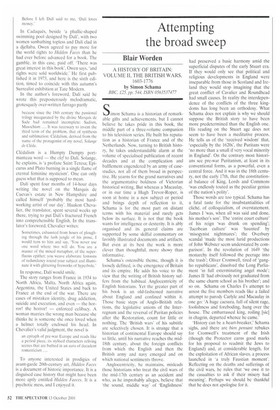Attempting the broad sweep
Blair Worden
A HISTORY OF BRITAIN: VOLUME II, THE BRITISH WARS, 1603-1776 by Simon Schama BBC, £25, pp. 544, ISBN 0563537477 Simon Schama is a historian of remarkable gifts and achievements, but I cannot believe he takes pride in this book, the middle part of a three-volume companion to his television series. He built his reputation as a historian of France and of the Netherlands. Now, turning to British history, he takes understandable alarm at the volume of specialised publication of recent decades and at the complication and bafflement engendered by an army of casestudies, not all of them broad in perspective. He yearns for the grand narratives and the argumentative boldness of Victorian historical writing. But whereas a Macaulay, or in our time a Hugh Trevor-Roper, is soon at home in a new subject or period and brings depth of reflection to it, Schama is for the most part on distant terms with his material and rarely gets below its surface. It is not that the book wants for intelligence or dexterity. It is ably organised and its general claims are supported by some skilful commentary on lavishly illustrated documents and artifacts. But even at its best the work is more clever than thoughtful, more showy than informative.
Schama's ostensible theme, though it is loosely defined, is the emergence of Britain and its empire. He adds his voice to the view that the writing of British history suffers from the habitual Anglocentricity of English historians. Yet the greater part of his book is an old-fashioned narrative about England and confined within it. Those basic steps of Anglo-British relations, the legislative unions of the Interregnum and the reversal of Puritan policies after the Restoration, count for little or nothing. The 'British wars' of his subtitle are selectively chosen. It is strange that a historian of continental Europe should say so little, until his narrative reaches the mid18th century. about the foreign conflicts from which the English and then the British army and navy emerged and on which national sentiments throve.
Anglocentricity, he maintains, misleads those historians who treat the civil wars of the mid-17th century as an accident and who, as he improbably alleges, believe that 'the sound, middle way' of 'Englishness' had preserved a basic harmony amid the superficial disputes of the early Stuart era. If they would only see that political and religious developments in England were inseparable from those in Scotland and Ireland they would stop imagining that the great conflict of Cavalier and Roundhead had small causes. In reality the interdependence of the conflicts of the three kingdoms has long been an orthodoxy. What Schama does not explain is why we should suppose the British story to have been more predetermined than the English one. His reading on the Stuart age does not seem to have been a meditative process. He tells us of the 'received wisdom' that, 'especially by the 1620s', the Puritans were 'no more than a small if very vocal minority in England'. On the contrary most historians see pre-war Puritanism, at least in its conventional forms, as a powerful, even a central force. And it was in the 18th century, not the early 17th, that the constitutional balance of King, Lords and Commons 'was endlessly touted as the peculiar genius of the nation's polity'.
Those words are too typical. Schama has a fatal taste for the insubstantialities of cliché, of colloquialism, of overstatement. James I 'was, when all was said and done, his mother's son'. The 'entire court culture' of his reign 'was drunk on spending', 'Jacobean culture' was 'haunted' by 'misogynist nightmares', the Overbury scandal 'made the most lurid productions of John Webster seem understated by comparison'. In the revolution of 1649 'the monarchy itself followed the peerage into the trash.; Oliver Cromwell, tired of `gungho republicans', dissolved the Long Parliament 'in full exterminating angel mode'; James II lad obviously not graduated from the same charm school as his brother', and so on. Schama on Charles I's attempt to arrest the five members reads like a failed attempt to parody Carlyle and Macaulay in one go: 'A huge caesura, full of silent rage, foolishness and foreboding, hung over the house. The embarrassed king, roiling [sic] in chagrin, departed whence he came.'
'History can be a heart-breaker,' Schama sighs, and there are [lien pensant rebukes for Cromwell's treatment of the Irish (though the Protector earns good marks for his proposal to readmit the Jews to England) and, at considerable length, for the exploitation of African slaves, a process launched in 'a truly Faustian moment'. Reflecting on the deaths and sufferings of the civil wars, he rules that 'we owe it to the casualties to ask if their misery had meaning'. Perhaps we should be thankful that he does not apologise for it.


























































































 Previous page
Previous page